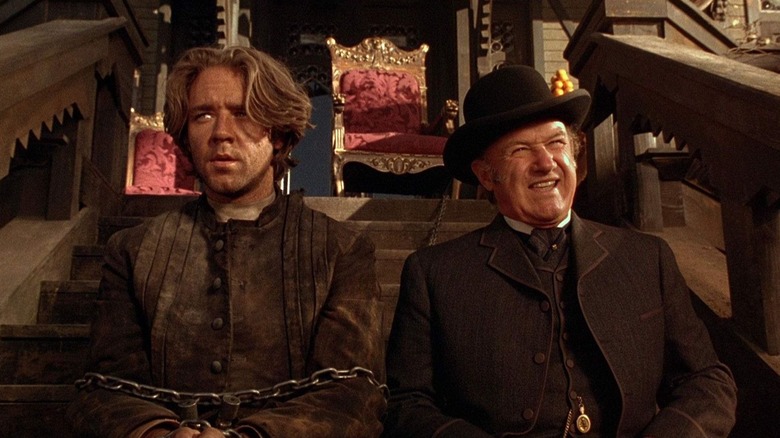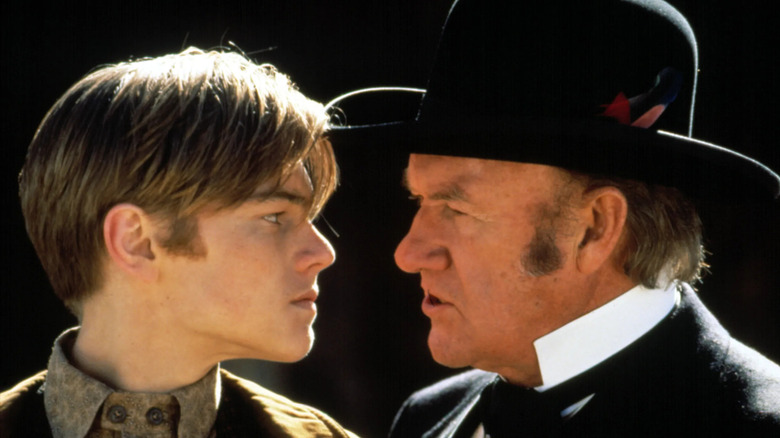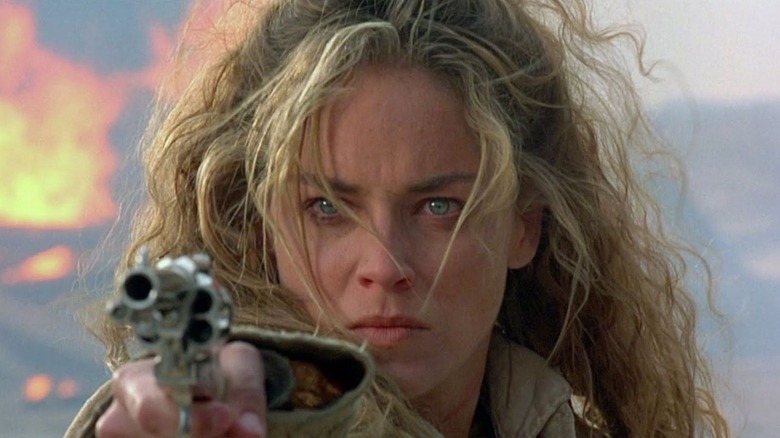Studio Executives Didn't Want Russell Crowe As The Lead In This Gene Hackman Western
I always loved the classic scene at the end of "A Fistful of Dollars" when Joe (Clint Eastwood) wanders back into town for a final shootout with the chief baddie and his henchmen. Ramón (Gian Maria Volonté) repeatedly guns him down, only to watch with disbelief as he rises again and reveals an improvised bulletproof vest beneath his poncho. That's a neat metaphor for the Western genre as a whole –- every time it gets consigned to Boot Hill, it staggers to its feet and keeps on shooting.
After a moribund previous decade, Hollywood Westerns were enjoying a rude burst of health in the early-to-mid-'90s after the Oscar-winning successes of "Dances with Wolves" and "Unforgiven." During this period, Gene Hackman seemingly sauntered from his juicy role in the latter to play a very similar villain in Sam Raimi's "The Quick and the Dead," a playful homage to Sergio Leone's spaghetti westerns that even featured a similar act of bullet stopping. The project was green lit with Sharon Stone in the headline role after the success of "Basic Instinct," with the star also signing on as co-producer. But the studio was not happy with her pick of Russell Crowe as the heroic love interest.
The premise of the movie is simple. Stone plays Ellen "The Lady" McKenzie, a classic wandering gunslinger who rides into the dusty Old West town of Redemption. She arrives on the eve of a quickdraw contest arranged by the sadistic mayor, John Herod (Gene Hackman), secretly seeking revenge for the murder of her father. Herod has put up a huge cash prize for the winner, attracting a variety of crooks, professional killers, and braggarts to take part in the competition. Chief among them are Ace (Lance Henriksen), a dandified sharpshooter; Clay Cantrell (Keith David), a business-like hired gun; and The Kid (Leonardo DiCaprio), Herod's boastful son who just wants to earn his dad's respect. Also reluctantly involved is Cort (Crowe), a reformed outlaw-turned-preacher forced to participate by Herod, his former partner in the bad old days. The strong line-up also features an array of colorful supporting actors including Pat Hingle, Kevin Conway, Mark Boone Junior, Tobin Bell, and Roberts Blossom to add a little extra atmosphere. Yet Sharon Stone had to use all her clout in Hollywood to fight for Crowe and another key cast member.
Sharon Stone used star power to fight for her casting choices
Once Sharon Stone was cast in "The Quick and the Dead," she set about using her star power to call the shots. She was given final approval over the director and opted for Sam Raimi on the strength of "Army of Darkness." That choice met with the approval of the studio, and Stone made doubly sure by insisting she would walk away if Raimi wasn't at the helm. Finding someone to play Cort was more troublesome as Stone wanted a virtually unknown Aussie actor in the role.
A few years earlier, Crowe had made a major impact playing Hando, the charismatic leader of a gang of Neo-Nazi thugs in "Romper Stomper." At that point, however, he was still much of a mystery outside his home country. Originally auditioning to play a different role in "The Quick and the Dead," Stone pushed for him to be cast as the male lead instead. Years later, Crowe explained the situation during an interview on "Late Night with Seth Meyers" (via People):
"[Sharon Stone] was kind of in a sword fight with the male producers on the film and she just put her foot down and said, 'I'm going to hire the person I want to hire as the love interest [...] If it wasn't for her strength of commitment, I don't know how long it might have been before I got an American movie. I've got a lot to thank her for."
Stone got her man, and Crowe wasn't the only future A-lister who had the star to thank for their part in the movie. Despite coming off the back of an Oscar nomination for his performance in "What's Eating Gilbert Grape?" the execs were not convinced about casting Leonardo DiCaprio as The Kid. To Stone's mind, DiCaprio was the only young actor who totally nailed his audition, but the studio gave her an ultimatum. If she wanted him, she would have to pay his salary out of her own pocket. That she did, and the showdown spurred Stone into signing on as a co-producer for the film. Stone's commitment to the two actors paid off; while "The Quick and the Dead" wasn't a major critical and commercial success at the time, Crowe and DiCaprio are two of the best things in the movie.
How The Quick and the Dead plays out
Given he was hired on the strength of his original "Evil Dead" trilogy, Sam Raimi directs "The Quick and the Dead" with all the visual flair you would expect, enjoying himself immensely with a flashy range of dolly zooms, dutch angles, mega close-ups, and a few ghoulishly fun touches like the victor of a quickdraw viewed through a gaping hole in the loser's skull. It is a mixed bag, however, because just as Raimi can't keep his horror and his humor separate, his more outlandish flourishes detract from the drama and suspense for much of the movie.
Sergio Leone is the obvious point of reference and the first hour or so never quite amounts to anything more than an elaborate pastiche. With such a rudimentary revenge story populated by stock characters, the film boils Leone's Spaghetti Westerns down to their most crucial element: The showdown. Raimi nails the heightened style, but there is one big difference. For all their operatics, Leone's films are self-contained worlds where those nail-biting few seconds before the draw are intensely pointed inward towards the characters. This is it, the final moments before they kill or get killed. Conversely, Raimi is so obviously showboating for the audience that many of the early confrontations in "The Quick and the Dead" feel like the Hollywood equivalent of a staged shootout performed for tourists at a Wild West theme park.
The dramatic stakes certainly improve as the dead wood is whittled away and we get down to our final four competitors, and it probably won't surprise anyone who they are. This is where the casting really comes into its own. Gene Hackman is a given — he could chew scenery with the best of them without resorting to hammy theatrics, and he imbues Herod with sleaze and menace with equal relish. Sharon Stone seems a little tentative with her Clint Eastwood-isms in the early stages, but she grows into her character and we are really rooting for her by the end. But it is Crowe and DiCaprio who really sell the final act, with the Australian radiating the same kind of soulful charisma that he would bring to his Oscar-winning turn in "Gladiator," and Leo delivering the film's most heart-rending moment in The Kid's showdown with his father. It goes without saying that Stone was right to fight for both of them, as their subsequent careers have proved.


